










The Code Blue program protects homeless individuals from inclement winter weather when temperatures dip below freezing, ensuring that those individuals are directed to shelter.
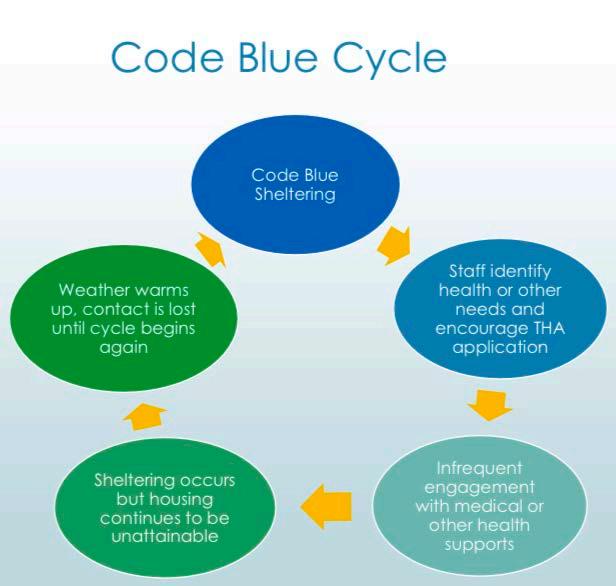
In Tompkins County any individual using this program is directed to other housing and social support services by Department of Social Services staff. The Code Blue program is operated annually from mid-October to mid-April — though other resources are available year-round and can be found at: https:// tompkinscountyny.gov/dss
Tompkins County Department of Social Services Commissioner Kit Kephart has said that eligibility for Code Blue is self-reported and based on the weather. Kephart also shared that the program is vital because some individuals don’t take advantage of other social supports but will still seek shelter when the weather becomes harsh.
Locations for the program include a 19-bed shelter, congregate sheltering including places of worship and other locations with large rooms, and in some instances hotels as well.
Kephart detailed further data on sheltering, reporting that the demographics of shelter programming is shifting. More women and families are seeking shelter than in past years, with the number of families reported in her presentation nearing 20 and the number of women being nearly 30 – both doubling since 2021.
Legislator Mike Lane (D-Dryden) asked about who the people who seek
the services are, and whether they are originally from the community or are out-of-towners seeking services here. Kephart responded that predominantly the people seeking services are from Tompkins County, having lived here for some period of time, though there is somewhat of a transient population –perhaps slightly increased during Code Blue programming.
Legislator Mike Sigler (R-Lansing) asked about the relationship between homelessness and mental health issues or substance use, to which Kephart responded that the number is between 25-35% of individuals identifying substance use or mental health issues. Kephart added that she is concerned because much of the data is based on
self-reports and would predict it is higher than reported. Following further inquiry from Sigler, Kephart said that Single Room Occupancy housing is of the greatest need locally from her perspective.
Legislator Travis Brooks (D-Ithaca) asked about the amount of rental assistance available to folks through DSS, which Kephart reported to be around $380-$400 for someone who is single and without children seeking shelter. Brooks further asked about how many people who utilize Code Blue on a regular basis are ineligible for services because of sanctions, which Kephart reported at around 30% while acknowledging that because of the self-reporting it is hard to track.
Ithacans attend the recent Open Doors English community pot-luck dinner.
(Photo
This year's Ithaca Makers Market will be held on Saturday and Sunday, December 17th & 18th, 2022 10am-5pm. We changed our location this year due to high demand and in the hopes to invite more vendors to participate!
We have been building a strong group of elite vendors from all over the FLX region and are happy to announce that we have 35 confirmed as of right now, and hope to end up with 45-50 total by the time we close applications!
The event will be held at the Cliff Street
Retreat (the old Incodema warehouse on 96 leading in and out of town) in Ithaca, NY A high visibility warehouse on one of the major roads coming in and out of Ithaca.
In addition to having vendors join us, we will have 2-3 local food trucks and a full bar, showcasing local beer, wine and cider!
Visit
a SS o C iat E p u B li S h E r , x 1214 larry @ i thaca t im E s com
F r EE lan CE r S : Barbara Adams, Stephen Burke, G. M Burns, Alyssa Denger, Jane Dieckmann, Charley Githler, Ross Haarstad, Steve Lawrence, Marjorie Olds, Henry Stark, Bryan VanCampen, and Arthur Whitman
THE ENTIRE CONTENTS OF THE ITHACA TIMES ARE COPYRIGHT © 2022, BY NEWSKI INC.
All rights reserved. Events are listed free of charge in TimesTable. All copy must be received by Friday at noon. The Ithaca Times is available free of charge from various locations around Ithaca. Additional copies may be purchased from the Ithaca Times offices for $1. SUBSCRIPTIONS: $89 one year. Include check or money order and mail to the Ithaca Times, PO Box 27, Ithaca, NY 14851. ADVERTISING: Deadlines are Monday 5 p.m. for display, Tuesday at noon for classified. Advertisers should check their ad on publication. The Ithaca Times will not be liable for failure to publish an ad, for typographical error, or errors in publication except to the extent of the cost of the space in which the actual error appeared in the first insertion. The publisher reserves the right to refuse advertising for any reason and to alter advertising copy or graphics deemed unacceptable for publication.
The Ithaca Times is published weekly Wednesday mornings. Offices are located at 109 N. Cayuga Street, Ithaca, NY 14850 607-277-7000, FAX 607277-1012, MAILING ADDRESS is PO Box 27, Ithaca, NY 14851. The Ithaca Times was preceded by the Ithaca New Times (1972–1978) and The Good Times Gazette (1973–1978), combined in 1978. FoundEr good tiMES gazEttE toM newton
Public sector labor unions have come out against the city’s resolution to allocate $110,000 of taxpayer money to hire outside counsel to replace the City Attorney in contract negotiations through the end of 2023. CSEA, FDA, DPW and Executive Association leaders say the city should prioritize re-building relationships with their workers through direct negotiations without having lawyers at the table.
This pressure wasn’t enough to convince the city to reverse its decision, but it did lead to the Common Council decreasing the amount of money allocated towards hiring outside counsel to $60,000.
Jeanne Grace, President of the Executive Association asked the Common Council to consider if swapping out one lawyer for another is going to rebuild trust between public workers and the city administration.

According to Grace, “The FDA and DPW — as well as the Executive Association — have no legal representation at the table. We are reasonable people just looking for fair treatment. Why can't we just meet with honesty and respect and come to a compromise without arguing through lawyers?”
In response, Mayor-elect Lewis said, “It is my firm belief that the unions do have legal representation at the table.”

The PBA has retained legal representation in past contract negotiations,
and the Firefighters Association began using a lawyer in the current round of negotiations for the first time in at least 15 years, only in response to the city using an attorney at the negotiating table.
Grace continued saying that she encourages the council to think of other options “rather than just sending another attorney to deal with us.” Additionally, she would like to encourage counsel to think about how the newly appointed Chief of Staff, Deb Mohlenoff, can play a direct role in facilitating negotiations.
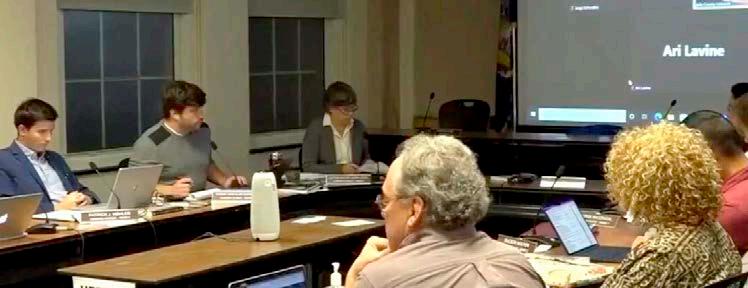
“I would also encourage the council to postpone voting on this resolution,” said Grace.
John Kohler, President of the Ithaca Professional Firefighters Association, told the Common Council that the resolution was a step in the right direction but that they should delay the vote on it because he doesn’t “think it's complete enough or an accurate representation of workers' needs.”

According to Kohler, “We're asking for fair and reasonable treatment, and I think the next best step would be for labor leaders to sit down with the Mayor, the new chief of staff, and a couple of council members to really discuss solutions.”
Cornell professor and labor, criminal law and civil rights practitioner, Lee Adler — who has represented Ithaca Firefighters for the last 20 years — told the Common Council that it would be a mistake to spend $110,000 of taxpayers


money to hire outside counsel when the city has a very competent Chief of Staff that can participate in contract negotiations.
Adler said that this is a “fabulous opportunity” for the Common Council to listen to city employees and admit that there's something wrong with the structure that they’re using in negotiations. According to Aldler, “It's not getting us anywhere. It's creating anger in the workers and it's going to cost us another $110,000. I think it’s time to rethink the structure of how to proceed.”
According to Adler, “You can make these workers okay by making the Chief of Staff — not a lawyer — sit across from public sector labor leaders to hammer the stuff out.”
Following Alders comments, David Marsh said that employers — unlike lawyers hired to negotiate contracts — are directly connected to their workers and can sympathize with what they’re asking for. As a result, he says contract negotiations that take place directly between an employer and employee typically last three or four sessions. Contract negotiations that take place with a lawyer tend to last much longer.
According to Marsh, “In 2002 with no lawyers we settled in six sessions. In 2006 with no lawyers we settled in less than 10 sessions. However, in 2010 lawyers came in and negotiations took 31 bargaining sessions, and it's been that way for every contract thereafter.”


 By Bill Chaisson
By Bill Chaisson
Greg Hartz is an Ithacan. He graduated from Ithaca High School, he attended Cornell University and, interrupted by brief sojourns in New York City and Italy, he has lived and worked here ever since. And after he retires from his position as president and CEO of the central New York division of Tompkins Trust next spring, he will remain in the Ithaca area.
In January 2023 Hartz will have been in banking for 40 years. A job at Citizens Savings Bank, the branch on the Common, brought him back to Ithaca from New York. He worked there for 12 years, four of them after it was acquired by M&T Bank.
“I was always interested in business,” Hartz said. “My grandfather owned several businesses in Deposit [east of Binghamton on the Delaware River].” His father Ed was the director of facilities and utilities at Cornell, giving him a family background in both business and management. Hartz was a business major in what was then the Department of Applied Economics and Management and is now the Dyson School.
“He is his father’s son,” said Dan Fessenden, a director on the Tompkins Trust board. “Ed Hartz had a home in Aurora, near where I live. He was called ‘the mayor of Aurora.’ I could definitely see that Ed and Greg were related.”
The younger Hartz’s interest in business is what drew him to community banking
rather than investment banking. “In community banking you work directly with consumers and businesses,” he said, “helping them to meet their basic financial needs. You help people get homes and mortgages, and you help small businesses and entrepreneurs.”
Hartz has also walked the walk. Immediately after college he worked for Greenwich, Conn.-based Chesebrough-Ponds, a holding company for innumerable consumer products from Vaseline to Ragù Spaghetti Sauce. In the late 1990s, after his tenure at Citizens Bank, he and a partner bought the rights to the Voice of America Europe. (The U.S. government curtailed operations at the end of the Cold War.) “We commercialized it,” Hartz said.
“We made it into 24/7 music and entertainment that was available by satellite, mostly in eastern Europe.” He owned the company for four years, living in Milan for two of those years.
Two decades ago he returned to Ithaca to work in the Wealth Division of Tompkins Trust, which specializes in financial advice and investments management. He
“I have had the pleasure of working with Greg Hartz since 1994,” said Helen Talty, a senior vice president at Tompkins Trust, “when we worked for the same large regional bank. What stands out most is that in the 28 years that I have known Greg, [is that] he is the same person as he was before becoming president of Tompkins Community Bank.” This is a familiar refrain when you ask people about Hartz: they can’t say enough about his decency, his openness and his competence.
“Since 2007 I have worked directly for Greg overseeing the branch network,” Talty continued. “He is always accessible for all staff and customers. Greg is always willing to speak to customers when they are upset about a process, and the customer comes away feeling heard and respected. With Greg retiring, there will be a large hole in our community as Greg is a leader who has helped numerous organizations with his time.”
One of those organizations is Ithaca Area Economic Development (IAED). Hartz has been on the board of directors since 2007, as well as the executive committee of the nonprofit, including a stint as chair. “He is so reasonable and rational,” said Heather McDaniel, president of IAED. “He is so heartfelt in everything he does.”
Ithaca resident Daniel Slattery is putting together a time capsule that will be placed somewhere on within the new West End bridge.
Almost 2.7 million New Yorkers, or 13.9% of the State’s population, lived in poverty in 2021, according to State Comptroller DiNapoli’s report that looks at poverty trends for the last decade in the Empire State.

The International Rutabuga Curling Championship is taking place Dec. 17 at the Ithaca Farmers Market Pavillion. Seen Readers’ writes is here! Check out the prompt in this paper!
IF YOU CARE TO RESPOND to something in this column, or suggest your own praise or blame, write news@ithacatimes. com, with a subject head “U&D.”




Have you started Christmas shopping?
Yes. I’m already done.
Shopping in progress.
No. That’s for Christmas Eve.
Visit ithaca.com to submit your response.
My friend Shelley had terminal cancer; she would die as the tumors grew, eventually crushing her lungs, heart, and other organs. Knowing the pain and indignities to come, Shelley wanted to choose a life-end that was gentle, peaceful, and at a time and place of her choosing. If she had lived in New Jersey, Vermont, or 8 other states, she would have been able to use Medical Aid in Dying to obtain a prescription that would allow her to choose that kind of death. But she didn’t. Instead, she suffered at the end of her life –needlessly – because she lived here in New York, which has not yet made this legal.
My mother lived in California, which legalized medical aid-in-dying 7 years ago. When she had terminal cancer, facing the same path to death as my friend Shelley, she had the option Shelley so desperately wanted and could not have because she lived in New York. My mother requested and received medical aid-in-dying. She had a gentle, beautiful life-end, with her daughters and sons-in-law at her side, in her own bed, in her own home, at her own time.
Medical Aid in Dying allows a terminally ill, mentally capable adult, who has

a prognosis of six months or less to live, to have the option to obtain a life-ending medication, which they must be able to selfingest. The Medical Aid in Dying Act is currently before the New York State Legislature.
The law is carefully written to provide protections and safeguards. Two physicians must certify that the person has a terminal illness, with less than 6 months to live, and is mentally competent to make medical decisions. The underlying terminal illness, not medical aid in dying, will be listed as the cause of death on the death certificate. Participation in Medical Aid in Dying is voluntary for all – the dying person, physicians, and pharmacists.
Medical aid in dying has been legal in some states for more than 25 years. Studies show that this end-of-life option has brought comfort to terminally ill people – whether they chose to use it or not, has increased the use of hospice and palliative care to reduce pain and suffering at the end of life, and improved doctor-patient communication about end-of-life care.
Let’s talk about Medical Aid in Dying – what it is and isn’t, experiences with the law in other states, and the effort to make this compassionate option available to New Yorkers.
While attending Ithaca College Casey Verderosa fell in love with Ithaca. After graduation in 2007, she pledged she would someday return. In 2016 Casey and husband Dan returned to Ithaca. Dan works with TataCornell Institute, which focuses on agriculture and nutrition issues in India, and Casey is the Executive Director of Ithaca Welcomes Refugees.
“During the previous Administration, I kept reading about immigrant families fleeing violence and poverty and arriving in the U.S. Traumatized by leaving one’s home. Their accounts of their treacherous trips to safer countries were heartbreaking. Then, to read that traumatized children were being torn from their parents’ arms at the U.S. Border was unbearable. My heart went out to these families.”

From November 2021 until November 2022 IWR welcomed 33 people of all ages, most arriving from Afghanistan and Ukraine. Before our new neighbors arrive in Ithaca, IWR begins preparing: Once IWR learns how many people are arriving, their ages and needs, IWR volunteers begin to search for the most difficult part of relocation: housing. IWR volunteers sign families up on long wait lists for affordable housing. Casey notes that some Ithacans have offered housing in their homes to incoming refugees, from three weeks to three months. Recently IWR began providing some funding for the security deposit and the first month’s rent on an as-needed basis. Sometimes IWR must also raise funding to subsidize the rent. Two local landlords and a realtor assist IWR in locating all possible open housing. Once housing is in place, IWR works on acquiring furnishings to make the rental space a home.
Each new family is supported by an IWR volunteer group to welcome the new arrivals. “We work to settle in new arrivals of refugees and at-risk immigrants, and to help the families, once settled, to plan what they need to do to have a healthy life in Ithaca.”
Often IWR volunteers introduce new families to Catholic Charities staff members Sue Chaffe And Paige Rich, who are invaluable, linking families with public programs such as health insurance and legal expertise on immigration matters.
School-aged children are enrolled in schools, where they can often access outstanding English as Second Language (ESL) programs. Pre-school children are also accommodated, when parents are ready to take ESL classes or become employed or enrolled in job-training programs.
Global Roots Playschool, a program of Ithaca Welcomes Refugees, offers a warm, supportive daycare program for children 18 months old-kindergarten age. Global Roots Play School is a short walk to Open Door English ESL classes, which many parents attend and love. (Liz Susmann: Opening Doors to English for our new neighbors, Ithaca Times, Sep 28, 2021.)
Parents are welcome to visit their children during Playschool. "One mother stayed with her child all day long, all year long, and that was fine. Sometimes parents speak a little English and can translate for their child. Currently, we have eight languages spoken in GRP—Turkish, Chinese, Uzbek, Persian, Spanish, Burmese, Tamil, and of course, English. We use Google Translate, photos, and acting to communicate.”
“We realize IWR parents and children have suffered great trauma, and we are as flexible as possible, so that all members of the family feel as supported and as comfortable as possible.”
Casey notes that the daycare program is so inviting and fun that many local families pay on a sliding scale for their children to be in this popular Playschool.”
Newly arrived families often need a few years of support, as they make the huge transition to a new life in a new country, far from their families left behind. Tompkins County Legislator Shawna Black has been instrumental linking IWR with our county’s Human
SCENE: The shop floor in Santa’s North Pole compound. It’s ten days before Christmas, and normally the place would buzz with supremely choreographed, assembly-line toy making, but the floor is jammed to capacity and work is at a standstill, as a routine status meeting has turned into a collective bargaining confrontation between the elves and LARSEN E. WHIPSNADE, Santa’s in-house attorney. Self-appointed spokes-elf KYLE has the floor…
KYLE: ...and another thing: we haven’t had a raise since Richard Nixon was President of the United States.
SANTA: Ooh! He was on the naughty list! I remember. I almost ran out of coal...
WHIPSNADE: Not now, sir. You elves...we have a process for negotiations. This here? This is an obscene spectacle. You should be ashamed of yourselves. At Christmas, no less!
KYLE: A process! Yeah, a process that’s already lasted ten Christmas seasons. You’ve been stonewalling us! We work all year, try to keep up with the latest toys, meet or exceed minimum yuletide cheerfulness standards, and all for what? No raises and reduced benefits! We can’t keep going!
WHIPSNADE: (to Santa) All I’m hearing is ‘blah, blah, blah’. Am I right, sir?
(Santa is suddenly very interested in the Nice List scroll, which is unfurled down to the floor.)
KYLE: When’s the last time we were able to recruit a new elf? There are nine vacancies in the rocking horse division alone right now. We’re running on empty, I tell ya.
WHIPSNADE: This is starting to feel personal, like a mob attack. It isn’t me. I’m just doing what Mr. Claus tells me to do.
(Everyone looks at Santa, whose eyes are glued to the List. A moment passes.)
WHIPSNADE: Huh! Ambushed by a bunch of elves, eh? You ingrates leave me no choice. So...I’ve requested that we take $110,000 from the toy budget...wait, $60,000... and bring in an outside attorney to take over. You’re going to see what it’s like to play hardball with a professional... hardball-player!
KYLE: Wait...what? So you can take $60,000 for that, but there’s no money for raises? Maybe you’d like to build these dollhouses yourself, Whipsnade!
WHIPSNADE: That tears it! You’re all on the Naughty List!
Pandemonium ensues. The air is thick with toy parts, candy canes, pointy elf shoes, and ornaments. SANTA hustles to an exit, WHIPSNADE ducks under a workbench in time to dodge a hurled quart tub of Play-Doh, and children around the world inexplicably feel a queasy sense that Christmas might not happen this year.
There is a sign that those opposed to the proposed Zoning law in the Town of Caroline have placed by the side of Route 79 in Slaterville Springs. It reads, ‘There’s a War in the Valley, Time to Pick a Side.’ Under that admonition, written in red on a white background, are secured two of the now ubiquitous signs, seen all over town, that read, ‘Town of Caroline, est. 1811 NO ZONING NEEDED.’ When Russia invaded Ukraine, the word ‘War’ at the top of this sign was briefly covered up by the words ‘No Zoning Needed,’ perhaps a tacit acknowledgement of how horrifying an actual war is. Now, though, the cover-up is gone, so we are back to having a declaration of war right across from our town government buildings.
As a Quaker, I do not consent to this roadside command to choose a side in a war. This is not a war. This is a debate about land use. I respectfully reject the Us-Against-Them framework.

One sign that sums up the habitual dividing of neighbor against neighbor in this war, posted prominently next to Caroline Elementary school, reads 'We are the Reason They Want Zoning; They are the Reason We Don't,' Yikes. Who are We and who are They? Again, I decline my consent and refuse to be placed in this categorization.
What if there is only Us and we are all in it together? What if we could think of this conflict over zoning as a way to acknowledge that it takes all of us to be “We the People Who Love Caroline”?
Services Coalition. Local foundations have been generous to assist with other unmet needs.
While Casey and Dan Verderosa lovingly raise their children, they are grateful that they live in such an open, welcoming community. “We wanted to make a difference in the lives of people who were less fortunate than we are. And through our work with Ithaca Welcomes Refugees and Dan’s Tata Institute we can fulfill that goal.”
Those wishing to support local refugees may donate to IWR at ithacawelcomesrefugees.org/donate. To stay in the
loop about IWR happenings, there is a link on the website to subscribe to IWR's newsletter. For questions about Ithaca Welcomes Refugees, please email ithacawelcomesrefugees@gmail.com.
IWR is participating in the Ithaca Alternative Gift Fair on December 10; a great way for the community to support local nonprofits, including IWR, while purchasing gifts for loved ones. To stay in the loop about IWR happenings, subscribe to IWR's newsletter on their website at ithacawelcomesrefugees.org. Those wishing to support local refugees may also donate to IWR at Those wishing to support local refugees may also donate to IWR at ithacawelcomesrefugees.org/ donate.
In order to promote their case against zoning, my anti-zoning neighbors are taking advantage of the many ‘Us against Them’ lines of reasoning already present in our town, throughout our divided country, and in our fractured world, in this polarized time. Exacerbating and exploiting division to win a war you’ve declared only fuels conflict and forces all disagreements into the ‘you’re either with us or against us’ framework. In a community of people with divergent viewpoints and experiences, this kind of approach to our differences makes it difficult to seek constructive and creative solutions.
Starting from the assumption that we all love this place we call home, I observe my anti-zoning neighbors making use of the following polarizing cultural divides: rural vs. urban, rich vs. poor, more-educated vs. less-educated, farmers vs. nonfarmers, people with money vs. people with land, liberal vs. conservative, ‘people who have been here for generations vs. those recently arrived, and, of course, Republican vs. Democrat.
Frequently a deeply ingrained and subtle anti-government ideology runs through their arguments as well, so they also make use of a ‘government can be used for good’ vs. ‘government is always out to get us and take our money’ divide.
I have seen and heard my anti-zoning neighbors accuse members of the town board not being responsive to the needs of ‘the people,’ and of being involved in nefarious and shady kickback schemes from shadowy federal and state government entities. Caroline Town Board members are not enemies in a war. They are fellow town citizens doing the job they were duly elected to do by a solid majority of voters, at least in part because those voters wanted them to explore zoning as a possible way of responsibly planning for our town’s future.
Meanwhile, members of the Zoning Commission have volunteered countless hours to serve their town. Just because my anti-zoning neighbors are not hearing the words they want to hear does not mean that elected leaders are not listening. In fact, the zoning commission has invited feedback and incorporated that feedback into the draft zoning law every step of the way, and has included in its body those with reservations or outright opposition to zoning.
Here is an example. My anti-zoning neighbors have expressed a deep concern for the legacy of racial and class discrimination in zoning laws across the country. I happen to share this concern. Even though some among them have lifted up that concern while simultaneously selling off pieces of their own land at prices that economically and politically disenfranchised or less capitalized people are very unlikely to be able to afford, I believe they are sincere in their concern. Assuming good faith and not the use of an existing cultural contention to further their own anti-zoning objectives, the willingness of the zoning commission to address con-
Whatever you celebrate this time of year, the holiday season is a time of generosity, community and giving. Here in Ithaca and Tompkins County, we have a seemingly endless number of non-profits, run by people who want to serve others and give back to their communities. That can make it hard to decide where to give back this holiday season. While no non-profit is more deserving than another, for our annual Give Local issue we choose five local organizations to feature. This year, we’ve chosen the Community Dispute Resolution Center, Open Doors English, National Alliance on Mental Illness Finger Lakes, Khuba International and Unbroken Promise Initiative.
The Community Dispute Resolution Center (CDRC) is the local mediation center, which focuses on helping individuals in conflict interact which each other.
“Conflict can make interactions difficult and understanding difficult,” Gina Williams, director of mediation programs, said. “So how can we support those who are stuck in this negative space? How can
we support them to empower them to have conversation and interact with each other?”
People can go to CDRC for mediation in family disagreements, neighbor disputes, employer-employee issues and landlordtenant disagreements. They also get referrals from Ithaca City Court and family court, but mediation is available for anyone in the community.
“The beauty about it is we only need one person who wants to work on the conflict,” Williams said. “We’ll reach out to that [other] person […] because you never know until you ask, and maybe that other person was just waiting for that invitation.”
If the other person won’t agree to mediation, Williams said CDRC also offers conflict coaching. The person who does want to work on the issue is coached by a mediator and given different strategies and tips to deal with the conflict. They’re also encouraged by the coach to explore the issue from the other person’s perspective.
“It gives people the opportunity to not have to file in court,” Williams said. “They can work things out on their own and make decisions themselves.”
If you’re interested in supporting CDRC, you can do that by volunteering or through financial support.
People who apply on www.cdrc.org to volunteer as a mediator will do a 35-hour training for basic community issues like landlord-tenant and neighbor-neighbor disputes. They will then participate in a six-month apprenticeship under a trained mediator, a video-taped roleplay, observations and mediations with their coach. All disputes are mediated by two trained mediators, so after going through the full training a volunteer can begin mediating with another volunteer.
Financial support can be donated at www.cdrc.org/donate.
“At CDRC we look at conflict differently,” Williams said. “It’s a normal part of life, and it’s just helping people respond to that in a different way.”

Open Doors English is an English as a second language (ESL) program for adults
that helps immigrants and refugees learn English and find community.
“We serve people from all over the world,” Liz Susmann, program co-director, said. “Last time we counted it was about 35 countries over the course of the year.”
Susmann said the school has had about 200 students so far this year, with about 100 currently in the program.
“We offer classes four days a week, morning, afternoon and evening,” she said. “We serve students at every proficiency level, from all different backgrounds and walks of life.”
Some students come from countries where they had very interrupted formal educations, while others had PhDs in their home countries. Some students are farm workers while others are lawyers.
“We have a very diverse group of students,” Susmann said. “It’s really wonderful to create these relationships inside school.”
There are no eligibility requirements for Open Doors English, anyone can walk in the door and sign up for classes. Enrollment is rolling and people can enter and exit the program at any time. Students pay tuition on a sliding scale, which starts at $0.
“Our default is to offer classes for free,” Susmann said.
Open Doors English tends to become more than just an ESL program for many students, Susmann said. It becomes a safe place for people to make friends and connections with people who they can relate to.
“It helps them get their foot in the door and feel more connected to the community,” she said.
This year, about a quarter of the students are refugees from Ukraine, which Susmann said has been a particularly rewarding experience.
“We know they came under really traumatic circumstances, so it’s especially meaningful for them to feel safe, relax, smile, laugh, joke and build friendships even though there must be so many difficult things in their lives,” she said.
With classes often offered for free, tuition makes up only a very small amount of the school’s finances. The rest comes through donations and local grants.
“We’ve had grants from the Community Foundation, Park Foundation, United Way and others, but the bulk [of financial support] comes from the generosity of donations,” Susmann said.
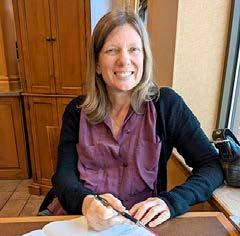
If you want to support Open Doors English financially, you can donate online at OpenDoorsEnglish.org. The website also has information about how to mail a check. If you want to get involved, you can fill out the form at https://sites.google.com/view/ open-doors-english/contact?authuser=0.
Volunteers can participate as classroom assistants, one-on-one tutors or behind the scenes.
“To me what sets our program apart is that we are an English school but we do so much more for each other than teach English lessons,” Susmann said. “We are a community, we operate out of love and care and concern for each other, we seek connection and kindness […] There is kindness that permeates our program that I find inspirating and very transformational for myself. The kindness we offer each other has the power to change the world.”
The National Alliance on Mental Illness (NAMI) Finger Lakes educates and advo-
cates for people who are living with someone with mental illness.
“We support and take care of caregivers,” Sandra Sorensen, executive director, said.
NAMI Finger Lakes has a variety of programs, though some are still working their way back up following pandemic cuts. Sorensen the most influential class is called Family to Family, which is an eight-week class for anyone living with someone who has mental illness.
“It’s a really good overview of mental health,” she said. “It teaches the signs and symptoms to look for, how to set boundaries, and there’s also a built-in support group with people going through the same thing.”
There’s a family support group and a spousal support group that are commitment-free – people can come and go from those as they please.
Other programs include Basics, which is a shorter class similar to Family to Family. It’s designed for parents who have a minor with mental health issues and is a one-time class that gets information to parents who are struggling.
A program that hasn’t picked back up yet is called End the Silence, where volunteers go into local high schools and do a presentation on mental health. It fulfilled the legal mandate that requires schools to educate students on mental health issues.
Homefront is a program designed for people living with military veterans who are suffering from mental illness, and NAMI Smarts educates people on how to advocate for policy change.
Aside from Family to Family, all of the above mentioned programs are not currently happening because of the lack of volunteers.
“Even the Family to Family course is only virtual because we only have two volunteers,” Sorensen said.
People who want to volunteer with NAMI Finger Lakes will be trained through NAMI at the state level. There are online virtual trainings (the next is in the spring)
and Sorensen said the process to volunteer can be a little bit slow because it’s important to make sure people are adequately trained.
Volunteers are also required to have lived experience with supporting folks with mental illness.
“A lot of what we do is support people in a peer-to-peer relationship,” Sorensen said. “A lot of volunteers come from our classes. So we’re looking for people who want to participate in our program, have lived experience and who want to give back.”
There are also office-type volunteer opportunities including office work, committee work and tabling at events.
Sorensen there is one additional requirement for volunteers.
“Everybody that works for NAMI as a board member or volunteer has a genuine heart to want to help somebody,” she said. “If someone reaches out for help or support, they will go the full mile to hold that person’s hand and make sure they get that support […] NAMI makes sure to get you connected to the right resource even if we aren’t it.”
Visit https://www.namifingerlakes.org/ volunteer/ if you want to volunteer. If you want to support NAMI Finger Lakes financially, you can donate at namifingerlakes. org/donate. It also has information on how to send a check.
Khuba International is a Black-led non-profit that combines youth education, sustainable agriculture and community development using hands-on programming and inclusive partnership-building. While the programming is inclusive, it is aimed at the BIPOC community.
Quarter Acre for the People is a program that supports farmers in the area and neighboring cities who have been marginalized and excluded from the traditional
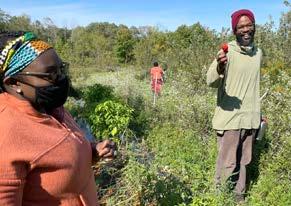
farming landscape, Director Christa Nuñez said.
“We support them in obtaining land, farming training and co-op development so they can create viable farms in the area,” she said. “We do that in cohorts each year. We try to obtain pieces of land for these folks to steward and own and live on cooperatively.”
Ubuntu Library aims to help young readers find a book each month that highlights their unique cultures. It’s particularly aimed at children who don’t have access to many books at home and focuses on buying books that feature children and central characters of color.
“That way everyone can find and own books that make them feel good about themselves and teach them things about the environment, agriculture and self-esteem,” Nuñez said.
The Farming for Freedom Trail is an agrotourism trail that links farmers of color to each other in a tourism app. Nuñez said a full website for the Farming for Freedom Trail will launch within the next couple of months, and there are plans to celebrate the farms with the community in 2023.
Nuñez said the idea for Khuba International came from her own personal experiences. When she was a young mother living in California, she wanted her children to grow up on a farm but realized it was unaffordable to buy land. After her family moved to Ithaca and bought The Learning Farm, she said she wanted any family to be able to farm, learn about agriculture and grow up with animals in their life if that’s what they choose.
“We want to uplift people’s dreams of farming, but also create an educational support,” she said.
Nuñez said the response has been extremely positive, and that Quarter Acre for the People has single mothers developing land and building houses while the children learn and help guide their future plans for what type of plant, bird and animal species they want to prioritize.
“It’s beautiful so see the joy in their eyes as they make plans,” she said. “To see them
really enjoy the time they spend in the garden, to see them really enjoy the time they spend in the garden, see them eat really healthy, good food that they’ve been able to pick themselves.”
If you’re interested in supporting Khuba International, you can do so through volunteering or through financial support. You can volunteer with the new farmers in the Quarter Acre for the People program and help build dwellings and plant trees. Volunteers will learn construction skills through Khuba International-held community events. You can also donate money to any of the above programs at https:// khubainternational.org/donate/.
“Khuba International is a non-profit that’s very engaged in the vital systems that will help our community thrive in the long run with equity in race, gender, class and ability,” Nuñez said.
Unbroken Promise Initiative (UPI) is a grassroots neighborhood revitalization and racial justice non-profit dedicated to uplifting the West End, according to its website. UPI was founded by Ithaca native Jordan Clemons during the Black Lives Matter protests in the summer of 2020.

UPI did not respond to an interview request in time for this story, but in a story written by the Ithaca Times in July 2020, Clemons said he hopes to eventually establish a “localized economy within the West End that will give residents the resources and opportunities they’ve long felt denied: better access to youth services, childcare, better nutritional health opportunities and vocational, educational, mental and physical health services.
The City of Ithaca’s 2022 budget included funding for Unbroken Promise Initiative for the first time. It’s unclear if it was included in the 2023 budget.
To support Unbroken Promise Initiative, visit https://www.unbroken.us/support.

So many people complain when changes come to the sport they have known, they see only the negatives, but not Eric Parker. Parker has been the head wrestling coach at Ithaca High since 2008, he became an assistant in 2004, and before that he wrestled at many different levels. He loves the sport, and now that more and more girls are joining the ranks, he likes what he sees. Back to that later.
2021 was a very dynamic season for Ithaca High, as the Little Red sent three wrestlers to the state tournament. George Oroudjov, was a senior last year, and he battled his way to the number two spot on the podium, losing to the nation's number one ranked wrestler.
Daniel Parker – now a junior – made it to the “blood round,” meaning one more win would have put him on the podium, and Quinton Getzin drew a lot of attention as a state qualifier as an eighth-grader.

The team is off to a strong start this year, having competed in three dual meets and two tournaments. At the Goodrich Tournament in Newark Valley, Parker took the top spot, beating a State top-three kid along the way and earning the tournament's Most Outstanding Wrestler in the process. Getzin took a gutsy second, dropping his title match to a kid named Sixx Cook from the powerhouse Central Valley program.
The Little Red has welcomed a host of younger wrestlers, and a newcomer with a lot of mat time under his belt. Dakota Hamilton came over from Trumansburg, and while he has been battling ACL injuries for two seasons, Parker is confident he will help the team immensely.
Also new to the team are Mira Cohen and Josie Leonard, two young wrestlers joining the growing ranks of young women in the sport. In Parker's words, “This is a huge initiative for out team and our coaching staff. Several Section IV teams have added girls to their rosters. Some have twelve or 13 girls, and some have hired girls' coaches.”
The growing number of girls entering the sport is a good for a number of reasons, Parker offered, saying “Typically, girls just had to wrestle against boys, they rarely had the opportunity to compete against other girls, they had to wrestle against mixed competition.”
That is an ever-changing situation, and last season Section IV put on an all-girls tournament that drew enough wrestlers to field eight different weight classes. Parker likes the influx of girls, for both mixed and all-girl competition. “Getting more kids involved is always a good thing,” Eric
stated. “Some schools have a tough time filling their rosters, and this really helps.”
I brought up the rumblings on the streets, the contention put forth by some that girls should not compete against boys, and Parker has heard it all, He said, “It's true, some have always seen it as a lose/ lose situation.” Of course, many believe that winning against a girl makes a male wrestler as a bully (my words, not Parker's), and losing to a girl is seen as humiliating. That view is an outdated one.


 By Lyndsey Honor
By Lyndsey Honor
Sustainability efforts have been on the rise all around the world, and Ithaca is no exception. SewGreen is one business in town that devotes its operation to a re-use and recycle focused future. Formally located at 12 N. Cayuga St., the company has just recently moved to the Press Bay Court (112 W. Green St.).
SewGreen was founded in 2007 and has built itself from the ground up on a three-fold mission: saving good, salvageable materials from going to the dump, providing meaningful, creative jobs for young people, and teaching sewing as a lifetime skill. Since its opening, owner Wendy Skinner and her team have saved over 250 tons of material from going to landfills, simply by upcycling.
Donations of unwanted fabric, yarn, and anything else related to sewing or needlecrafts make up for the bulk of SewGreen’s material inventory. These contributions come from community members who are downsizing or moving from within a 200-mile radius. Aligning with their mis-
sion of sustainability, this means that their merchandise doesn’t involve the planetary impact of shipping from thousands of miles away. Skinner and her team work hard to recirculate their materials back into the marketplace and the wider community. They fill their store shelves with the things they like best and periodically donate surplus materials to not-for-profit organizations.
For over a decade, Skinner has been investing her time, money, and energy into fostering SewGreen’s mission, but this line of work is relatively new for her. “I’m a baby boomer who took a new career direction at age 60,” she said. “I had a good job in media relations, but with climate change looming, I felt compelled to find my own path to reducing greenhouse gases. I had an interest in fashion, and I knew I wanted to do something that would bring together a diverse following with sewing and fashion as a common interest.”
Skinner doesn’t sew much herself, but she’s found purpose in enabling aspiring sewers by providing the materials and tools needed to pursue their creative goals. At SewGreen, they offer classes and private lessons in sewing and knitting for everyone ages 9 and up. Over time, Skinner has learned to fix sewing machines and can efficiently show people of all ages how to use them. “I now offer same-day service for sewing machines,” she said. “Once you
make an appointment, I’ll fix your machine and return it to you within the same day.”
One of SewGreen’s biggest projects in recent years has been to develop a line of upcycled denim clothing, which can be purchased in store. This is just the start because Skinner wants to expand their market in the future. As Skinner continues to develop the brand, she’ll be drawing upon her own fashion expertise, but also that of her target audience: young people.
Something many people don’t know about SewGreen is that the floor’s almost entirely staffed by teenagers. Skinner’s vision to engage the youth in sustainability practices extended to her hiring process. Sofia Boggs-Fernandez, one of the store’s teenage workers, has been nicknamed “Little Boss” by Skinner because she juggles and takes on managerial duties with great maturity. “I consult Sofia on many decisions and trust her, along the rest of our all-teenage staff, to run SewGreen in my absence,” Skinner said.
Working alonside young people and watching them develop careers in sustainable fields has been rewarding for Skinner. This initiative has made SewGreen a model for similar companies, and Skinner hopes that more continue to follow in its footsteps. Ithaca and the world at large have a long way to go in developing long lasting sustainability, but SewGreen continues to use its mission to stay vocal for the cause.
Be sure to check out SewGreen in its new location. The whole team’s finally getting settled, and they’re ready to welcome customers old and new into their improved space. “Moving SewGreen from North Cayuga Street to Press Bay Court has been an exercise in downsizing,” Skinner said. “I think we've done a good job of fitting everything in and staying true to our motto, ‘We make reuse beautiful.’ We love the new venue and the sense of community over here. Nothing else has changed. We’re simply taking advantage of a new opportunity with the desire to reach more people.”
Real Estate welcomes Amy Wood Gonzalez to her new role of Director of Operations and Office Manager, Ithaca. Amy's new role will include managing the Ithaca offices and agents alongside Brent Katzmann, Office Manager, Ithaca and Director of Finance. She will focus on the success and support of our Ithaca agents, along with guiding Warren Real Estate’s workflow strategy, Global HR, and organization of business practices and policies.
Amy Wood Gonzalez, NYS Licensed Real Estate Associate Broker, has been an active member of the real estate industry for over 19 years with a distinguished background. Amy's tenure at Warren Real Estate nears almost two decades, where she has been an accomplished agent and has most recently held the position of Market Manager for Horseheads, Watkins, and Corning Offices. She has consistently proven her leadership skills and her commitment to results and excellence, and has a strong ethical and detail-oriented foundation.

Amy is a Past President of the Ithaca Board of REALTORS (2009) and currently serves as their State Director. She was named “REALTOR of the Year” in 2013. Amy also serves on several committees for the NYS Association of REALTORS, including Fair Housing and Cultural Diversity, Professional Standards, and Global, Resort & Second Home Markets. She is also the 2022 Chair of the NYSAR Leadership Academy Advisory Board and the Immediate Past President of the NYS Real Estate Education Foundation.
"We are thrilled to welcome Amy to this new position. Her skills align completely with her new role and we know she will thrive in this capacity. She will be an asset to the Ithaca agents and to the company operations. She brings a breadth of experience, knowledge, and vision that will strengthen our organizational leadership."
Bryan Warren, Presidentinterests, including deep vein thrombosis, pulmonary embolism, heart failure, atherosclerosis, and other cardiovascular diseases. He joined the MMRI in 2018 as an instructor in the lab of Dr. Jason McCarthy, an Associate Professor whose research focuses on nanoparticle drug delivery platforms and fluorescence imaging technologies. Dr. Kessinger also manages the histology, imaging, and surgery core facilitates at MMRI.
Dr. Chase Kessinger Promoted to Assistant Professor, Underscoring the Importance of Deep Vein Thrombosis and Pulmonary Embolism Research at the Masonic Medical Research Institute
Before joining the MMRI team, Dr. Kessinger was an instructor at Massachusetts General Hospital (MGH) and Harvard Medical School. He did his postdoctoral fellowship training at MGH, working with Dr. Farouc A. Jaffer at the Cardiovascular Research Center. Dr. Kessinger earned his Ph.D. in Cancer Biology from the University of Texas Southwestern Medical School in Dallas and is a graduate of Texas A&M University with a B.S. in Microbiology.
MMRI is a non-profit dedicated to scientific research that improves the health and quality of life for all. We strive to conduct high-quality research aimed at developing a deep understanding of diseases and generating innovative cures and treatments. Visit us online at: www.MMRI.edu

Kessinger, Ph.D., was recently promoted to Assistant Professor at the Masonic Medical Research Institute (MMRI), adding a new lab to the growing Institute. Dr. Kessinger’s research utilizes imaging techniques to study a range of

Women and girls in Tompkins County will benefit from the $50,000 in grants being awarded this month by the City Federation of Women’s Organizations (CFWO). Among the recipients of the Women Building Community grants are the Finger Lakes Toy Library, Free Science Workshop, and Ithaca Free Clinic. See below for a full list of recipients.


Ten grants, up to $5,000 each, were awarded this cycle. The mission of CFWO is to act as a catalyst for the improvement of the lives of all women and girls in Tompkins County, thus making a contribution to the entire community.
Winning projects focused on Community Development, Education, Gender Equity, Health, Human Services, or Social Justice. Non-profit organizations and government agencies in Tompkins County are invited to apply for these annual grants that are awarded each fall. In the spring, applications will be accepted for the $10,000 innovation grant. Grants up to $1,000 for unexpected needs are accepted all year.
These are the projects receiving WBC grants this fall:
• Child Development Council: Removing Roadblocks & Postpartum Support
• Finger Lakes Toy Library: Volunteer Recruitment & Workshop Programming
• Free Science Workshop: Empowering Underserved Girls through Creative Experiences in STEM

• The Greater Ithaca Activities Center: GIAC Jumpers
• Habitat for Humanity: Teaching Carpentry, Building Confidence
• Ithaca Health Alliance: Ithaca Free Clinic Healthcare & Diagnostic Services for Women
• Ithaca Neighborhood Housing Services: Minor Repair Program - Women
• Homeowners Materials Fund
• Ithaca Welcomes Refugees: Global Roots Play School

• Open Doors English: The Julie Russ Coulombe Language Program: Open Doors English Sponsorship Program
• Village at Ithaca: Brown Babes Braiding, Phase 2
For more information about the CFWO, please go to www.women building community.org.

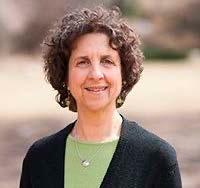
Parks & Trails New York announced the planned retirement in 2023 of its longtime Executive Director, and distinguished environmental advocate, Robin Dropkin. Heading the organization—whose mission is to expand, protect and promote a network of parks, trails, and open spaces throughout our state for use and enjoyment by all—since 1995, Dropkin has been critical to the nonprofit’s growth and impact.
Under Dropkin’s decades of leadership, PTNY has a long list of accomplishments,
including growing the perennial favorite Cycle the Erie Canal bike tour, and adding another tour launching in 2023—Cycle the Hudson Valley. Both these tours take place on the Empire State Trail, the longest multiuse trail in the nation, whose formation was a direct result of PTNY’s dedicated advocacy efforts. In the dark budget days of 2008, PTNY’s advocacy kept close to 100 NYS Parks from closing, and long-term has led to this year’s “game changing” budget and reinvestment in NYS Parks System, with a capital investment totaling $250 million.
Dropkin’s leadership has not focused just on the green spaces we love, but the groups and communities supporting them. PTNY’s Park & Trail Partnership Grants, doubled to $2 million this year, grew out of a PTNY pilot program. Now administered by PTNY in partnership with State Parks, the grant program supports nonprofit groups stewarding New York’s public lands across the state. Concurrently, PTNY has focused on trailside communities as well, launching a seed grant program for Trail Towns along the Genesee Valley Greenway—whose creation PTNY championed in the early 90’s—and building trailbased tourism support for towns across the state with programs such as Bicyclists Bring Business, Bike-Friendly Business support and certification, and an exciting Trail Town initiative. As a capstone to her time working for access to—and expansion of—public green space in New York State, Dropkin celebrates the passing of the $4.2 billion Clean Water, Clean Air, and Green Jobs Bond Act this November.
Parks & Trails New York’s search for its next Executive Director will commence immediately, with Dropkin staying to help the new ED transition. She is excited for the growth of PTNY’s core programming, and what the next chapter in the organization’s story will accomplish for NYS’s most treasured green spaces… and the New Yorkers that cherish them.
Many older adults often develop delirium, and there can be some confusion as to what delirium is. Delirium is a state of sudden confusion, and it is considered a medical emergency, similar to chest pain. The disorder usually occurs fast, often within hours or a few days. It can often be traced to one or more factors. They may include a medical problem, such as a severe or prolonged illness, or an imbalance in the body. The disorder also may be caused by certain medicines, alcohol or drug use, infection, or surgery. Symptoms such as trouble focusing and being easily distracted are also common.
They tend to be worse at night and in unfamiliar settings.
If a relative, friend or someone in your care shows symptoms of delirium, talk to the person’s health care provider. Your input about symptoms, typical thinking and usual abilities will be important for a diagnosis. It also can help the provider find the cause of the disorder. Call the marketing team at (607) 266-5300 to schedule a tour to see our facilities and learn more about lifecare at Kendal at Ithaca. Find us on the web at http://kai.kendal.org/
P.S. Symptoms of delirium are sometimes mistaken for symptoms of dementia.
Website:
cerns about discrimination has undercut the claim that our local leaders are ‘not responsive or responsible.’ It has also illustrated how local laws can be strengthened and tailored to meet local needs when conflicting interests have a seat at the common table. This is how we find strength in our differences.
The collective task before us is to take a sober and realistic look at the current state of our beloved town and ask ourselves what we want our future to look like. We do so at a time when many local economies have basically collapsed. All over the country small towns have virtually vanished, and formerly thriving ‘Main Streets’ have been replaced by corporatized big-box sprawl twenty minutes away. The gutting of small town and rural America is real and heartbreaking, and has led to despair, civic disintegration, and political polarization. Often it seems communities hitch their wagons to mythical corporate stars to try to resuscitate what is dying, but those corporations are profit extraction machines and just finish the job. The Dollar General was never going to save us, and neither would Whole Foods.
All Caroline neighbors, anti-zoning and pro-zoning alike, are grappling with the reality of change. Change, as we all know, is very hard. We need the gifts and strengths of all of us to forge a plan for our town’s future that fosters resilience in the face of these changes.
To counter the assertion of another anti-zoning sign, some of ‘We the People’ do not want zoning, but some of ‘We the People’ do. What if we tried to find a compromise that values everyone? Please, let’s declare a ceasefire in this war.
McDaniel and IAED also administrate Tompkins County Industrial Development Agency (TC IDA). “TC IDA was helped by the bank’s decision to remain downtown,” she said, “in spite of it costing more.” McDaniel was struck by the fact that Hartz was also easy to work with as an IDA customer, not just when he was participating in the decision making at IAED.
Hartz looks back on the decision to keep the division headquarters in downtown Ithaca as a rational one. “It was an important economic driver for the county to have a vibrant downtown,” he said. While he acknowledged that building in a green space anywhere else in the division’s territory would have been less expensive, he said it was the right decision in the long term. According to Hartz, having all those employees spending the day downtown was a big boost to the many small businesses that were also the bank’s customers; staying downtown closed a positive feedback loop.
This is the essence of what Hartz likes about banking. “The bank is at the economic center of the community,” he said. “The depositors trust their savings with the banks and receive services, and the deposits are lent to borrowers in the form of mortgages and other loans. The bank makes sure that economic needs of the community are met and that economic resources are distributed.”
Abby Peterson is vice president of marketing and communications management at Tompkins. She does not report to Hartz directly but works with his leadership team. “He’s very collaborative,” she said, “and he’s not afraid to make decisions. He wants all the information and he wants everybody at the table. It’s not just about checking a box. He wants to hear everyone’s contribution.
It is Peterson’s job to maintain the perspective of the customer, and she said Hartz understands the customer’s point of view. “He is consistent in living out the Tompkins Trust philosophy of putting the customer first, being of service to the community, having a local emphasis, and trying to use the best technology available.”
In 2016 Tompkins Trust expanded into the Syracuse market. Fessenden explained that for an Ithaca company to enter that market involved risk, but Hartz and his team laid it all out in a manner that convinced his board of directors it was a good idea. “We have done pretty well to grow our business in that market,” Fessenden said. He noted that banking has changed a great deal over the years, and that for Hartz to make a brick-and-mortar branch work required progressive thinking.

Steve Romaine, the president and CEO of Tompkins Financial Corp, said Hartz oversaw a strategy of expansion that was done on a sustainable basis. “He was always looking for the next opportunity,” Romaine said, noting
that Hartz closed at least one branch that was not viable and was careful about opening a new one. But Hartz understands that branch offices are important “Community engagement,” Romaine said, “is not believable if you aren’t physically in the community.”
Hartz weathered the economic upheaval that began in 2008, but said it did not affect Tompkins Trust or the Ithaca area like many other areas of the country. “That was because Tompkins Trust did not get involved with any of those risky loan products,” the CEO said. “We had none of those subprime loans with the low teaser rates and high margins. Most community banks were never involved in that, and the regional banks in central New York are more solid than the average. We work hard to make sure the loan quality stays solid, and we are careful with our underwriting to make sure that a loan can be repaid.”
When the pandemic hit in 2020, the world stopped, said Hartz. “We had a lot of concern for businesses that were without customers. How were they going to make their loan payments? Tompkins Trust moved early to make loan deferrals with no restrictions. That took the stress and the urgency out of the situation. Some business came off the deferrals in a matter of months, but some stayed on until well into 2021.”
Dan Fessenden recalls that period. The federal government sent Payroll Protection Plan funds, but left it to the banks to administer them. “Greg and his team worked 24/7 making sure that applications for resources were processed,” Fessenden said. “Through it all he and his team had their own personal challenges because of the pandemic.”
Hartz acknowledges that there has been a tremendous amount of development in downtown Ithaca. “There has been a crane present
constantly for the last 15 years,” he said. “There is a lot of new housing and commercial space.” Although there were no high rises in town when he was in college, he believes that Ithaca is still Ithaca.
“At its core,” he said, “it is similar to the town that I grew up in. It is centered on higher education and it leads the country and even the world in its thinking, often being first. It was the same 40 years ago. There are a lot of principled, intelligent people here who are very creative. Ithaca challenges everything, all the norms. That has been true for as long as I can remember.”
The bank president admits that there are fewer locally-owned businesses than there used to be. “There were four independent banks when I started,” he said. “Today there are still four, but only Tompkins Trust has its headquarters in Ithaca. This is true nationally; there has been consolidation in many industries.”
What is next for Greg Hartz? His wife Bev has retired from her position as clinical director at the Racker Centers. They have three grown children and a cottage on the lake. “We enjoy travel and want to see North America because we’ve traveled internationally,” he said.
Hartz is so heavily involved with so many nonprofits that he was reluctant to even name any, but he was quite proud of the annual Racker Rivals Big Red charity hockey game, which is played every summer to raise money for early childhood development programs at Racker Center. “I’ve played in it every year until last year,” Hartz said. “And this year we passed the $1 million mark.”
Romaine has always been impressed by Hartz’s level of commitment. “I don’t know if he has any free time to himself,” the CEO said. “He is so involved in the community, engaged in town and at Cornell.” Romaine said it was important for a banker to be visible and accessible in person. That was the essence of community banking. “Your competitors are accessible by phone or online … or they aren’t accessible.”
“I witnessed how much involvement he had with dozens of organizations; it was his defining characteristic,” said Fessenden. “It made him who he was and he shared that with his community.”
“I remember we were leaving an [IAED] meeting—it was about a year after I started here—and he stopped to chat,” McDaniel recalled. “He was in a referee costume because it was Ha loween. He didn’t know me, but he made the effort to talk to me.”
“Greg is regularly asked to ‘participate’ in bank events where he has to dress up,” Talty recalled, “He never complains about the silly outfits —Eagle Scout, Chef, Referee, Barber Shop Quartet. Over the years on Halloween, Greg has traveled to each branch to show off his costume and see how the branches have dressed up. He always was an excellent sport, and staff and customers loved seeing him.”
From the closing of the Haunt, to Covid-19 shutting down nightlife, the live music scene in Ithaca has had a rough couple of years. Now with covid-restrictions loosened and people regaining comfort in the idea of a night on the town, the music scene is expanding at a rapid rate in the form of new venues, familiar faces and local bands. Here’s a look at some promising developments:
Located on 121 Martin Luther King Jr. Boulevard in the basement of the Watershed, the Downstairs is a fairly new addition to the scene, soft-opening in August 2020. Ashley Cake, owner of both establishments, said music wasn’t in the cards at first, but when the pandemic prompted her to use the Downstairs as a private event space, she found an increasing demand from people wanting to hear live music.
One of the first live events Cake hosted was a stand-up comedy open mic, which continues to be one of the venue’s most popular events, hosted every Tuesday night starting at 7 pm.
“Despite all the [Covid] variants, it became a real community event and it felt really good for these performers to have a stage of some kind.” Cake said. “It got to the point where I said, ‘we need to pivot and I have to invest in the live entertainment aspect of the business in order for it to have a shot.’”
Just a short jaunt away from The Downstairs is The Upstairs (formerly Lot 10) located on 106 S Cayuga Street.
Despite similarities in names, the Upstairs has different owners, is a bit bigger and a bit louder, and offers a party-like atmosphere overlooking the Commons from its second floor perch. Its mix of bands and DJs can draw a variety of audiences on different nights, from college students to local residents.
While the Upstairs frequently hosts local bands, it also brings in larger out-of-town performers. Most recently, bassist Karina Rykman, who has played with the likes of Marco Benevento and Seth Meyers’ 8G band took the stage at the end of November.

Like most venues, the Upstairs also hosts a weekly open mic, on Wednesdays. The main difference here is a killer house band led by host/drummer/sometimes bassist Jeremy Bussmann of the local band Mostly Microbes. With an eclectic mix of performers ranging from jazz to rap to rock, these jams bring together unlikely combos of musicians and draws a surprisingly large audience, often going late into the night past 1 am.
Deep Dive is arguably making the biggest splash on Ithaca’s music scene as of late. Located on 415 Old Taughannock Boulevard, formerly the site of the Dock and previously Castaways, the venue has always been a prime music destination. Now with new owners and a substantial interior facelift, the Deep Dive has been hosting multiple acts a week, attracting locals and out- of-towners as well as a surprising amount of college students. The Deep Dive’s location away from the center of town certainly has its drawbacks, but where it lacks in foot traffic it makes up for in the potential to bring in nearby Trumansburg residents and
other travelers passing through the outskirts of town.
TJ Schaper who runs Deep Dive with Jack Clausen, went to Ithaca College and played Trombone in John Brown’s Body, performing at the venue when it was the Dock. Schaper met Clausen when they put together the Ithaca Night Bazaar this past summer at the Ithaca’s Farmers Market.
The Deep Dive sees itself as a “feeder venue,” acting as a club-level venue perfectly sized for bands that have outgrown the local bars but aren’t big enough to book the State Theater. Indeed, the venue has a bigger footprint than both the Downstairs and Upstairs.
Schaper also said he wants to cross-promote national and local music having smaller Ithaca-based bands open for larger touring acts and conversely have lesser-known touring acts open for popular hometown acts as well.
It is this type of diversity in both location and venue size that makes Ithaca’s live music comeback so exciting. While before it could sometimes seem as if the Haunt and State Theater were the only venues, now there is an abundance of choices all over the city for both local bands and out-of-town acts of all shapes and sizes to choose from.
Kevin Black, a local booking agent and promoter, agreed that the increase in venues has the potential to bring in new talent.
“Everybody’s always wanted to play here but they’ve never had the opportunity to play here,” he said. “There almost weren't enough places but now, there will be more opportunities to bring more of these acts that want to come in to play.”
Often overlooked as a music destination, Sacred Root’s atmosphere is worlds apart from the other destinations but a welcome alternative for music lovers seeking nightlife without the excessive noise or alcohol.

BEHAVIORAL HEALTH CLINICIAN: A Full Time position in a residential treatment center for adolescents. Provides clinical services within adolescent residential treatment units addressing trauma and substance misuse. Clinical supervision provided. Public Service Loan Forgiveness (PSLF) program available. MSW, MHC, MFT, MCAT, unlicensed psychologist/licensed psychologist start at $75,000, with licensure $85, 000 plus full benefits package.
CASE PLANNER: A full time position in a residential treatment center for adolescents. Responsible for the development and coordination of individual treatment planning for residents and their families. Implementation of treatment planning and discharge planning, along with appropriate continuing care recommendations. Bachelor’s or Master’s degree with a major in Human Services related field. One or more year’s direct work experience working with youth in a counseling position.
FAMILY SERVICES COORDINATOR: A Full Time position working with adolescents in a residential treatment center, providing services to our clients and their families. This position requires regular travel to the communities in which our clients reside. A Master’s Degree - preferably in Social Work, Human Services or Counseling or a Bachelor’s Degree and 3-5 years of direct experience working with youth and families in a counseling position, with a commitment to acquire a Master’s degree within five years. Position requires a valid NYS driver’s license.

REGISTERED NURSE: A Full-time position. Experience with adolescents preferred, good communication/organizational skills, ability to multi-task. Responsibilities include preventative health maintenance, evaluation, triage care, and record keeping. Competitive salary with shift differential.
 By Henry Starke
By Henry Starke
Thirty years ago I wrote the first of what has turned out to be a half dozen reviews of Moosewood restaurant.
When I wrote my first review there were eight co-owner/managers. A few years later that number had increased to 19, a seemingly awkward number to make a smoothly running management team. Now there are just three, none from the original group.
Moosewood, which opened in Ithaca in January 1973, specializes in vegetarian food with an international influence. It operates out of a small kitchen which selflimits its menu to three entrées and five salads at lunch and three salads and four entrées at dinnertime.

There have been many dramatic changes during the five decades it has been operating all, I think, for the better.








Some of the notable changes that have occurred over five decades: Beef moussaka is no longer on the menu. If you wanted to use a rest room about twenty years ago, you’d have to obtain a key, leave the restaurant, and walk a rather lengthy distance to a public facility in the Dewitt Mall. Now there are two restrooms in the restaurant proper. During the same period there was no bar…now there is one. One dining room has grown to three with a capacity of 90 indoors and an outdoor patio seating 40. Years ago, tipping was not allowed, now it’s encouraged. Fish and seafood used to be daily offerings, currently, they
are not. There are many more changes, too many to mention here.
A general comment about the vegetarian/vegan fare served at Moosewood: their cooks use a large amount of ingredients, including herbs, and spices. When cooks combine and blend so many ingredients into one entrée, there’s a likelihood that individual flavors will be sublimated.
In simple terms: The more complex the recipe, the more difficult it is to discern the flavor of the individual ingredients. This often occurs at Moosewood where I have always enjoyed everything I ordered.
For example: at a recent dinner I ordered Red Bean Jambalaya ($18) a traditional favorite here. The myriad of ingredients included house made vegetarian sausage, a dark rice flour roux, okra, bell pepper, tomato, carrots, zucchini, creole spices, and organic red beans. It was topped with a dollop of sour cream. I enjoyed the dish but none of those many ingredients stood out and, in the final analysis, the entrée seemed like a glorified meatless chili.
At another dinner I chose Barley & Roasted Brussels Sprout Salad ($12). Its ingredients included maple tahini-glazed Brussels sprouts, apples, baby kale, caramelized onions, pecans, chives, ciderrosemary vinaigrette, and local sprouts. Again, no particular ingredients stood out, however once again, I enjoyed the dish. Much of my enjoyment came from the crunchy texture.

Back in 1988, when I was two years in as NewsCenter 7’s film critic, when the film clips for “Die Hard” came in – they were ¾” tapes back then – I wasn’t that psyched about it. I had seen a couple of Bruce Willis movies that didn’t impress me very much – Blake Edwards’ “Blind Date” (1987) and “Sunset” (1988).


Of course, when I finally saw “Die Hard”, I knew within fifteen minutes that I was a watching a stone-cold classic action movie. “Die Hard” isn’t just a Christmas movie, it’s the greatest Christmas movie ever made. And of course I was there for the copycat deluge: “Die Hard in a mall”, “Die Hard in a hockey rink”, “Die Hard on a plane.” You can talk about the “Die Hard” sequels all you want, but once the stories veered away from Christmas and they stopped casting Bonnie Bedelia as Willis’ wife, for me, the series lost its mojo.
When the writers of “Violent Night” (Universal-87North Productions, 2022, 112 min.) had that lightbulb moment – “Let’s do ‘Die Hard’ with Santa Claus!” - I hope they lit up cigars. It’s one of those inspired notions, like Robert Rodriguez’s “Spy Kids”, where you can’t believe no one’s done it yet. Okay, I do remember “The Night the Reindeer Died” from “Scrooged!” (1988), but “Violent Night” is full-on “Die Hard”. “Violent Night” opens with Santa (David Harbour) drinking as much as he can in a London pub before reluctantly starting his rounds on Christmas Eve. Much like “Die Hard With a Vengeance” (1995), he’s lost his mojo. At a palatial private estate run by

a mean, salty matriarch (Beverly D’Angelo), the whole greedy family is having a miserable holiday, and just as Santa drops in to leave presents, a team of armed high-tech thieves led by John Leguizamo shows up to take what’s in the safe in the basement.
Until now, David Harbour hasn’t found the movie role to match his success on “Stranger two Things”, but I think he’s finally found his groove. Harbour plays his Bad Santa like the classic reluctant action hero: he doesn’t want to get involved, but he’s the only one who can help. He’s matched every step of the way by the very talented Leah Brady, the one pure soul in the family, and, it turns out, a big “Home Alone” (1990) fan, too.
Kudos to screenwriters Pat Casey and Josh Miller for hitting every “Die Hard” beat and every Christmas movie beat, and melding the genres together so seamlessly. Leguizamo and his team are a colorful collection of extreme action types, and each goon has his or her own distinctive personality and look. And somewhere in the last act of “Violent Night”, I suddenly remembered that one of John Leguizamo’s earliest acting gigs was playing, like, “Thug #4” in “Die Hard 2: Die Harder” (1990). He’s also killing it in a cool supporting role in Mark Mylod’s “The Menu”, and now to come full circle and get to play his version of Alan Rickman? Now, that’s a cool Christmas gift.
Joyeux Noel, y’all!
RIP Kirstie Alley (“Star Trek II: The Wrath of Khan”, “Sibling Rivalry”, “Look Who’s Talking”, “Village of the Damned”, “Deconstructing Harry”, “Drop Dead Gorgeous”)
Sacred Root has found its home in Ithaca for nearly a decade, first opening in 2014. It also can lay claim as one of Ithaca’s only late-night non-alcoholic establishments, staying open until midnight on Thursdays, Fridays and Saturdays. Replacing the alcohol with Kava tea, a soothing drink known for its calming qualities, also makes for an entirely different music experience for both audience members and performers.
“The musicians always feel like the audience is more present, more tuned-in and more considerate,” explained Sacred Root co-owner, Paul Galgoczy who founded the place with his wife, Judy. “The whole history of the use of kava is around people coming together as a community because of how that enhances the connection.”
Music has been at Scared Root since the beginning in the form of a variety of bands and genres ranging from electronic music, to folk to punk. The venue also welcomes art and dance as one of its many creative mediums.
The fact that Sacred Root is a nonalcoholic establishment also gives it the advantage of hosting all-ages shows, a
market that is often underserved. When it comes to accessibility, not selling alcohol makes it easier for younger audiences to enjoy live music in Ithaca.
Sacred Root is aided in its all-ages endeavors by Ithaca Underground, a local non-profit formed in 2007, works with young local artists and venues to put on these types of shows.
Bubba Crumrine, interim board chair for Ithaca Underground stressed the importance of hosting all ages shows to continue the tradition of live music in ithaca for many years to come.
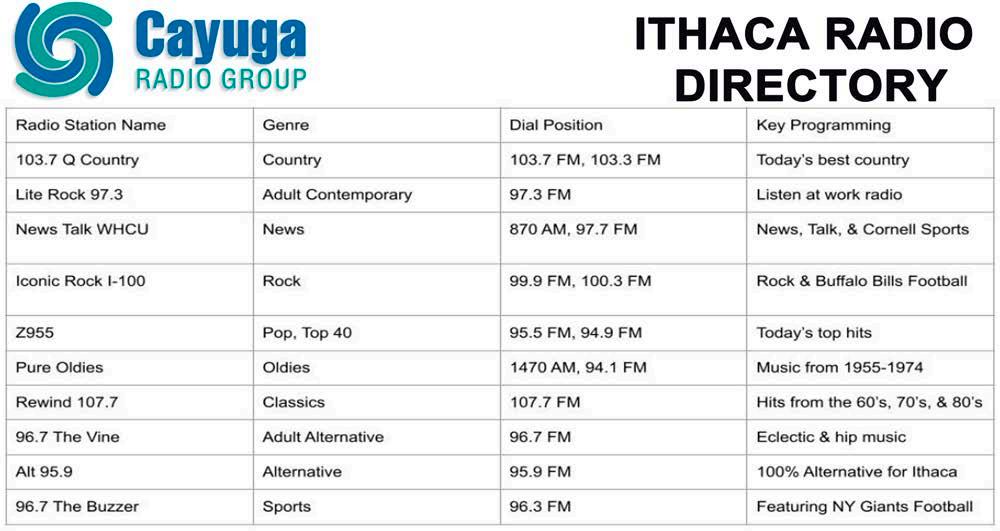
“If there’s no place for young people to see music, get inspired, and perform - why should they stay in town or be involved?,” Crumrine asked. “Being able to perform, learn about the music industry and how shows work and have a safe environment to make mistakes in when you’re young gives any musician a leg up for when you’re ready to tour and perform on larger events.”
Like the name suggests, perhaps the Haunt isn’t completely dead yet. Dan Smalls of DSP Shows, acquired the rights to the name and brand of the Haunt when it originally closed. The pandemic has put much of his plans for the Haunt on hold for the time
being, but talking with Smalls a few weeks back, he maintains that the search for the Haunt’s new home continues.
“I’m waiting for the right opportunity and the right partner to come along that really wants to dive in and take control of making it a special artist experience,” Smalls said. “For me to do it, we’re not going to do something where we have to apologize for anything. It’s gonna have the best sound system and the best layout and backstage.”
An interesting side effect of the increase in venues is what Charles Chatman, logistics comittee coordinator Ithaca Underground, describes as the decentralization of live music.
“No one person or organization represents a majority of underground music in town and no one place is the default location,” Chatman explained. “That variety of organizers is met by the variety of spaces where these shows can take place. Things aren’t the same as they were before but that isn’t all bad.”
Indeed, while promoters and bookers like Kevin Black, and Dan Smalls seemed to be in charge of most shows pre-pandemic, now many of the venues like Deep Dive have taken booking matters into their own hands. Ithaca Underground also reports decreased memberships when it
comes to venues reaching out to them to book all-ages shows.
Schaper says he sees the increase in venues as a way to encourage a higher standard to host musical events at a new level.
“It’s been cool to see each venue influencing each other to get shows and promote shows,” he said. There’s a fire lit to make Ithaca what it could be. As a community member it's an awesome thing to see.”
Looking to the future, as the music scene blossoms, it is no surprise an increasing number of venues want to get in on the action. Angry Mom Records, the longtime record store on the Commons, has joined the procession.
Angry Mom is currently in the process of moving from the basement of Autumn Leaves to the floor above the bookstore, which will essentially double it’s existing physical footprint. While the venue used to host monthly shows pre-pandemic, come springtime the record shop plans to ramp up events, using the larger space to create a stage and host local bands providing another all-ages setting. George
Back to Coach Parker's words, “We had a male wrestler lose to a girl recently, and she was simply a more experienced wrestler. In this sport, it's not always about strength.”
● ● ●
Congratulations to the entire Ithaca College football community, and to
Johann, owner of Angry Mom Records, is also a member of Ithaca Underground.
“We jumped on the opportunity to expand our physical footprint and also have the possibility of doing more in the music scene in the Ithaca area,” Johann explained
Despite the smattering of new venues in Ithaca, all of the local owners and promoters admitted they still see continued hesitancy on the part of the public to come out to shows, whether it be true to the lingering effect of Covid or rising costs of inflation.
first-year head coach Mike Toerper, who was chosen by the American Football Coaches Association as Division III Region 1 Coach of the Year. The Bombers put together an electrivying season, reeling off 12 wins in a row before losing to the nation’s #1 team. The Bombers rolled over most opponents, played grind-it-out, come-from-behind football when they needed to and, oh yeah, they hammered Cortland in front of 40,000 fans in Yankee Stadium to reclaim the Cortaca Jug. What a year!
“....”You’re still seeing that a certain portion of the population is reluctant to gather socially, but that said the rising tide generally helps all boats,” Smalls said referring to the increase in venues.
“This year’s been a bit better but it's definitely not back where it used to be where we would meet new people and get connected,” Galgoczy added.
In the larger picture, Schaper of Deep Dive, acknowledges the scene is changing in Ithaca, but he said he mainly sees opportunity.
“As far as Ithaca being what it once was, it’s never going to be the same, and I’m not saying that’s a good or bad thing,” Schaper said, “We're not trying to make it what it was, we’re trying to make it relevant.”
After several inquiries I learned the ingredients of a recent daily special, Hungarian Vegetable Soup: onions, tomatoes, bell peppers, zucchinis, yellow squash, celery, carrots, white mushrooms, green cabbage, marjoram, turmeric, dill, salt, pepper, paprika, red wine, and if you aren’t vegan, it was topped with a dollop of sour cream.
The Black Bean Burger ($17) has been a staple on both the lunch and dinner menus for years. It’s terrific. I like it a lot better than many of the beef burgers at other establishments. I even eat the top half of the roll which is a soft, sweet brioche bun. Pickled red onions and NYS cheddar add a mild, and welcome addition to the flavor profile. It’s accompanied by paprika roasted potatoes.
A dinner entrée, Strozzapreti Al Tartufo Nero ($28) is an excellent pasta dish. The pasta means, “twisted like a priest’s collar if you were to strangle him”, and encloses a wonderful sherry cream sauce.
I have mixed feelings about the beverage offerings. I like a choice of beers and wines from around the world and often choose a beer from Holland or a wine
from California or France. Here, the choice is limited to Finger Lakes wines and New York State beers. The wine list ($10$17) glass, ($40-$68) bottle is adequate. Wine drinkers might like to see a Sauvignon Blanc and a Pinot Grigio among the whites and an unblended Cabernet Sauvignon and a Merlot among the reds. There are only four beers, three in cans, one in a bottle, ($7-9). I have mixed feeling because as much as I like to choose wines and beers from around the rest of the United States and the world at large, I’m totally in favor of promoting local products and producers.
I can’t say enough about the service. Servers are attentive, caring, and professional.
Moosewood
215 N. Cayuga St. in DeWitt Mall (607) 273-9610


Open: Weds-Sun. 11:30-2:30; 5-9

Tid Bits: the aforementioned restrooms can be confusing. Both have a large “W C” sign on the door which could be taken as “Women”. In fact, they are unisex and the W C stands for water closet.
I admire management for not raising prices at dinner on the same items served at lunch.